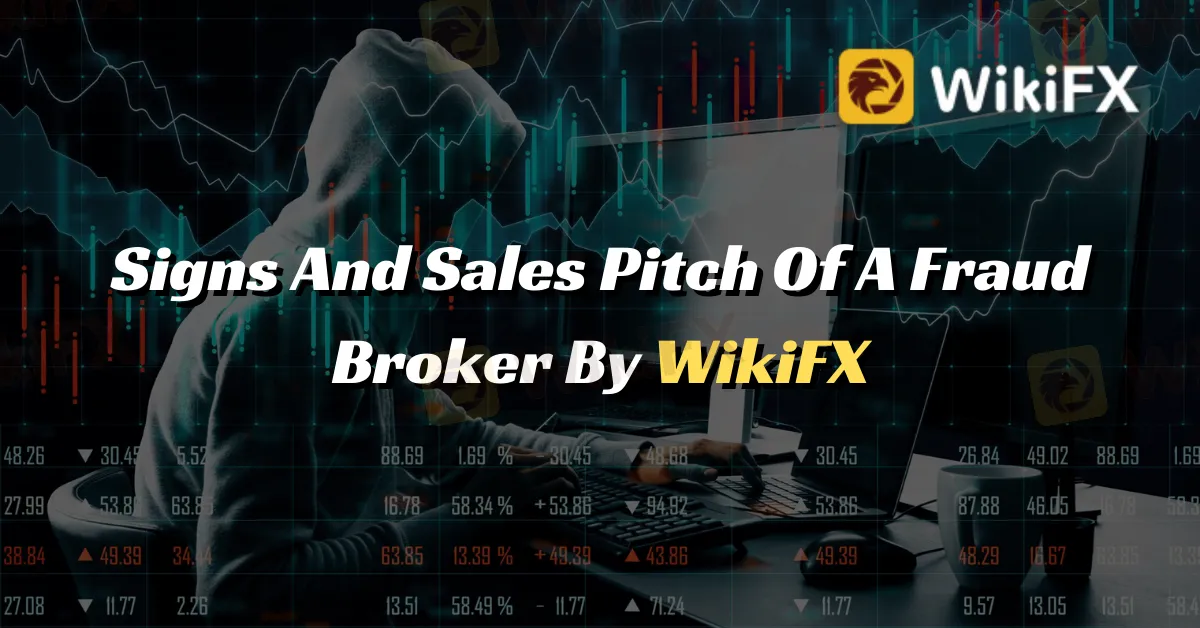简体中文
繁體中文
English
Pусский
日本語
ภาษาไทย
Tiếng Việt
Bahasa Indonesia
Español
हिन्दी
Filippiiniläinen
Français
Deutsch
Português
Türkçe
한국어
العربية
Signs And Sales Pitch Of A Fraud Broker By WikiFX
Abstract:The currency market is volatile and fraught with danger. It is not a good place to put the money you can't afford to lose, such as retirement savings, since you may lose most or all of it very rapidly. WikiFX has seen a significant increase in forex trading scams in recent years and wants to educate you on how to spot possible fraud.

Symptoms of a Potentially Fraudulent Sales Pitch
Make you feel you can benefit from current events that are already public knowledge.
Made by recommendations or emails from friends and family, members of community organizations, churches, or social clubs.
Contacts you and requests personal information such as your name, phone number, email address, and home address.
Assuring that there is no “downturning market” in FX.
Persuasion Techniques You Might Come Across
“Enticing you with the possibility of money and something you desire but can't have.”
“This Euro/dollar bargain is guaranteed to outperform your present assets.”
Attempting to establish credibility by claiming to work for a renowned organization or to have a unique background or expertise. “Believe me, as a 10-year senior vice president at this firm, I would never sell anything that doesn't deliver.”
Making you assume that other astute individuals have already invested.
“This is how your neighbor Bob got his start. I realize it's a lot of money, but I'm in—and half of our club is, too. It's well worth every penny.”
Offering to perform a minor favor in exchange for a large benefit.
“If you purchase now, I'll offer you half off my typical forex commission.”
By asserting a limited quantity, you might create a false feeling of urgency.
“With just two units remaining and the Asian market ready to open, I'd sign up right now.”
Watch for These Red Flags to Identify Foreign Currency Trading Scams
Promises that there is no “bear” market in FX
Firms claiming that you can or should trade in the interbank market
Requests for speedy financial transfers through the Internet, mail, or other means
Difficulty obtaining background information on the individual and/or firm
Use a lot of inquiries before engaging in Forex Trading.
Request the broker's website so that you may examine its regulatory status.
Check the address of the company so that you may check with the local financial authority to see whether the broker is registered.
Check the broker in the WikiFX App to learn about the broker's most prevalent concerns from traders all around the world.
Check to see whether the broker has a history of fraud.
If you decide to trade forex, do not deposit more money than you can afford to lose.
Do not take out a mortgage or cash your money.
Margin trading may hold you liable for losses that much surpass the amount you placed. Do not trade forex if you cannot afford to lose more money.
Stay tuned for more Forex News.
Use the download link below to download and install the WikiFX App on your mobile phones to stay updated on the latest news, even on the go.
Download link: https://www.wikifx.com/en/download.html

Disclaimer:
The views in this article only represent the author's personal views, and do not constitute investment advice on this platform. This platform does not guarantee the accuracy, completeness and timeliness of the information in the article, and will not be liable for any loss caused by the use of or reliance on the information in the article.
Read more

IG 2025 Most Comprehensive Review
This article evaluates the broker from multiple dimensions, including a basic introduction, fees, safety, account opening, and trading platforms.

EXNESS 2025 Most Comprehensive Review
This article evaluates the broker from multiple dimensions, including a basic introduction, fees, safety, account opening, and trading platforms.

WikiFX Review: Is IVY Markets Reliable?
IVY Markets, established in 2018, positions itself as a global brokerage offering a diverse range of trading instruments, including Forex, Commodities, Cryptocurrencies, and Stocks. The platform provides two primary account types—Standard and PRO—with a minimum deposit requirement of $50 and leverage up to 1:400.

Germany's Election: Immigration, Economy & Political Tensions Take Centre Stage
Germany is set to hold a crucial general election on 23 February 2025, with voter frustration over migration emerging as a dominant issue.
WikiFX Broker
Latest News
Why Do You Keep Blowing Accounts or Making Losses?
eToro Adds ADX Stocks to Platform for Global Investors
B2BROKER Launches PrimeXM XCore Support for Brokers
Germany's Election: Immigration, Economy & Political Tensions Take Centre Stage
WikiFX Review: Is IVY Markets Reliable?
Checkout FCA Warning List of 21 FEB 2025
Google Bitcoin Integration: A Game-Changer or Risky Move?
IG 2025 Most Comprehensive Review
It is Not True Love | Tips on Avoiding Romance Scams
XTB Secures Chilean License, Expands Latin America Footprint
Currency Calculator






